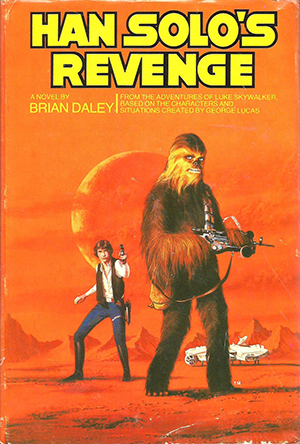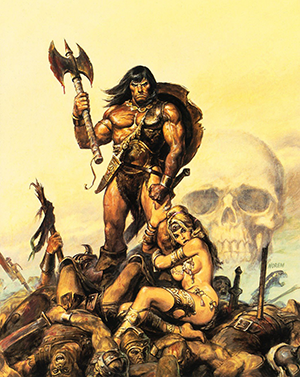Pulp. Undeniably awesome. Tautly written, unpretentious, imaginative, pure story from beginning to end. Even at its worst, it shot for a higher bar than any pretentious, whiny, narcissistic LitFic ever did.
Which is why the bastards killed it. Or, at least, they tried.
They tried to kill The Pulp, BUT THE PULP WOULDN’T DIE!
As a wise and undeniably sexy man said during the last Geek Gab, The Pulp lived on. It lived on in the Silver Age comics, in 1980’s Action Movies, and in Saturday Morning Cartoon shows. Wherever pretentiousness was banished and unselfconscious sincerity lauded, Fun was more important than Message, and imagination could reign unchecked, there you found The Pulp alive and well.
It even tried to survive in places it had no right to be, like in often-despised Sci-Fi movie tie-in novels.
Han Solo was the pulpiest element of the Pulp-ripoff “Star Wars” movies. He should be—he was essentially a clone of Northwest Smith, CL Moore’s roguish spacehound. He walked with a swagger, smiled with an off-kilter grin, and left a long string of broken hearts behind him.
 The Han Solo Adventures, 1979’s trilogy of novels about the swashbuckling smuggler, was set two years before the events of Star Wars during a difficult time in the life of partner lawbreakers Solo and Chewbacca. Lost in the reaches of the Corporate Sector, the pair must dodge the police forces of the Sector Authority whilst trying to make a dishonest (and sometimes even honest) credit. They make money and lose money, but never really get ahead.
The Han Solo Adventures, 1979’s trilogy of novels about the swashbuckling smuggler, was set two years before the events of Star Wars during a difficult time in the life of partner lawbreakers Solo and Chewbacca. Lost in the reaches of the Corporate Sector, the pair must dodge the police forces of the Sector Authority whilst trying to make a dishonest (and sometimes even honest) credit. They make money and lose money, but never really get ahead.
The novels are fun, and imaginative, and feature a number of interesting secondary characters (including beautiful and vivacious love interests). The plots are interesting and varied, and avoid falling into the sea of self-referential in-joke callouts that so blighted other “Expanded Universe” works. (It was 1979, a year before The Empire Strikes Back, so the number of archetypal elements the author could slyly refer to was very limited.) The novels even had a respectable amount of action, and were refreshingly un-pretentious. Yet for all that, the stories just aren’t Pulp.
At first glance, you might find that a bit puzzling—isn’t Solo stolen from Pulp? Doesn’t he do Pulpy things? Don’t the books hit all the criteria you mention above? JUST WHAT ARE YOU PLAYING AT, WARPIG?
Look, I could bafflegab on about how the books lack the moral core of Pulp literature (which they do), and toss in a couple of other observations about how the books reflect the culture and morals of post-1969 America (which they do), but that’s not the real reason. The real reason is this:
They’re just too damn slow.
Daley is a prime example of a post-[FORBIDDEN TERM CITIZEN] SF writer, someone who feels the need to toss in excess exposition and interstitial scenes all over the place just so he can explain stuff way more than is strictly necessary. (He isn’t alone in this impulse, many writers do this because they think The Rules require it.) It doesn’t take much excess verbiage to turn a tautly paced and plotted novel into a too-slow plodder, and Daley could have stood to trim about 5% of his wordcount. Then the books would have been Pulpy enough to pass muster.
LEARN THIS LESSON WELL, APPRENTICE PULPISTS: Always Be Cutting. Skip scenes that aren’t strictly necessary. Learn to use reference and imputation to IMPLY that something happened, so you don’t have to show it. Resist the urge to show off how clever your worldbuilding / thorough your research / accurate your science is. LET IT BE. LET THE AUDIENCE APPRECIATE IT ON THEIR OWN.
The point of Pulp is to entertain the audience. Authors who are trying to fish for compliments from other authors are Doing It Wrong. (Authors who are trying to fish for compliments from CRITICS aren’t even Doing Writing Wrong, they’re just whoring around.)
This is, by the way, emblematic of a larger problem in writerly circles: authors are way too concerned with garbage that doesn’t matter. Whether induced by suffering through a college English degree, reading (and believing) too many book critics, or grimly enduring the hippest, hottest writer’s workshops, authors who analyze stories as if they were an English professor, a sci-fi book critic, or a sneering post-Modernist literary critic are Doing It Wrong. These people are not fiction authors, and their analyses, right or wrong, are a bad foundation to build your story on.
Writing is a tough gig, so conscientious writers take advice from anywhere they can. More, it’s easy to find people willing to dish it out. (I, myself did just a few paragraphs ago, and am about to again.) This advice often becomes internalized and formalized into a set of Rules, which become a fundamental part of how writers see storytelling.
Instead of letting a story blossom and grow, letting it live and thrive, writers take their burgeoning piece of fantastic fiction and mutilate it, chopping off bits and pieces that should be there, and adding garbage which shouldn’t, all so they can force their story to exactly match The Rules that live in their brain. Ideological Rules, religious Rules, Rules of Literary Criticism—when used as straightjackets, they massacre storytelling.
My Advice: Don’t play Procrustes to the stories in your head. Love them and write them, with ruthless integrity. Don’t force them to conform to anybody’s Rules, yours or someone else’s.
If you want to write Pulp, write Pulp. Screw The Rules, and don’t let anybody else tell you that you’re Doing It Wrong.
Do this, and you too can keep the spirit of Pulp alive. They may try to kill it, but THE PULP WILL NOT DIE!
Jasyn Jones, better known as Daddy Warpig, is a host on the Geek Gab podcast, a regular on the Superversive SF livestreams, and blogs at Daddy Warpig’s House of Geekery. Check him out on Twitter.
Ah, you know I love you Warpig. That’s IMO the best part of Pulprev, is the cutting, this economy of words that means if you’ve got a big book it’s an actual big book. No padded bras here.
And the beauty of it is you can keep your literary references and learned allusions. Poul Anderson did it. The Broken Sword is the biggest embarrassment there is for modern fantasy. And it’s shorter than most Book 1 Part 1s. You just have to make them pull their weight.
-
Excellent point about Poul Anderson. Not just THE BROKEN SWORD, but Poul’s SF tales also rocked plenty of literary meat while keeping things moving.
“Enough, but not too much” isn’t an easy mark to hit, but there are sufficient examples out there for writers to reference.
It’s funny that you mention 80s action movies, because I was watching “Predator” yesterday, and was struck by how unapologetically over-the-top and just plain fun it is. And yet it still manages to be tense and exciting; the cartoonish elements don’t take you out of the story at all.
I think that relates to what you’re talking about here, because it’s a very simple story. It doesn’t claim to be serious business; it just invites you along for an adventure. As a result, a scene where four men spray bullets into the jungle while yelling at the top of their lungs is both more ridiculous and more fun and memorable than scenes in modern movies where heroes and villians destroy entire cities while fighting. I guess that’s because “Predator” is Pulp, and those new movies are not.
-
There really was a pulp revival in the 80s with Indiana Jones and Star Wars. It’s just too bad it didn’t connect with writers. It was just the wrong moment. If that sort of thing happened today it would be Our Time.
Never read the Han Solo novels. Daley’s two “Coramonde” books were pretty pulpy — as I recall — but it’s been about 20yrs since I read ’em. Considering when they were published, I always wondered if D&D got the lizardmen from those novels. The two match up pretty closely. Far more than vague references in Kuttner’s Venus tales. Plus, the Coramonde books had Vietnam-era grunts sucked into a war on a fantasy world, along with their APC! Right up Gygax Road.
I have an omnibus edition of the Han Solo books but haven’t gotten around to them yet…
One of the single biggest reasons I usually stick to old books is that the old stuff emphasized tight, ruthlessly efficient plotting so much. Every chapter moving the story forward in a clear, meaningful way, not “and now we shall follow the villain on a slow, introspective midnight stroll for 40 pages….”
Love these — my favorite SW spin-off novels. Of the three, I much prefer The Lost Legacy (hunt for the fabled Queen of Ranroon, the treasure ship of Xim the Despot) because it gave readers a glimpse into the galactic past.
Daley’s Cooramonde books weren’t bad, from what I remember. Never read the Han Solo novels, they sound like they’re worth a look.
Got to admit, DWP, you had me worried saying: “As a wise and undeniably sexy man said”, Whoa, that’s more than I wanted to know about that conversation.
However, you then referenced Procrustes, and anyone who can make a reasoned reference to a Greek demigod (Procrustes the Stretcher was a son of Poseidon) more than 2500 years old to bolster his argument is A-OK in my book.
PULP WILL NEVER DIE!
Enjoyed the Coramonde books of Brian Daley, reread them not long ago. I have been meaning to go back and reread his Han Solo books, thanks for the reminder.
Brian Daley also wrote another fantasy novel, A Tapestry of Magic, which from memory wasn’t all that bad.
Pure bare-bones adventure stories are fun for a first read. I won’t usually read them more than once.
I only read Han Solo at Stars’ End and really enjoyed it but, you are right, it wasn’t quite pulp.
A.C. Crispin’s The Paradise Snare is better. Although it wasn’t pulp and Crispin wasn’t even trying to do pulp. (I think she was trying to do tragedy and/or romance.)
